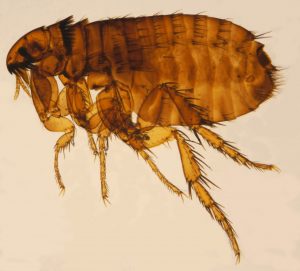Fleas are annoying pests that can multiply rapidly and make you and your pets miserable. It is important to understand the life cycle of a flea so that you can understand the best way to treat for fleas.
Eggs
Fleas will lay four to eight eggs after each meal. The amount may increase as the female flea gets older. The flea eggs are not sticky and will not stay on your pet, which is one reason you may need to treat the entire house for fleas after you pet gets fleas. Flea eggs can hatch in just one day, but they can take up to twelve days to hatch.
Larvae
After hatching, a flea will be larvae between four to eighteen days. Larvae are small and semi=transparent. The amount of time depends on how often the flea can feed. If it can feed more, then it will develop more quickly. The larvae do not feed on hosts. They will eat the feces of adult fleas or other organic matter that they can find.
Pupal Stage
The larvae will weave a cocoon and enter the pupal stage. This stage can last from three days to a year. During this stage, it will transform from a shape similar to a maggot to the adult flea stage. They will wait in this stage until they know that there is a meal nearby. This is the stage that can last the longest.
Adult Flea
The adult flea can live several months on a host. The adult female can start laying eggs after 48 hours, but she does need a blood meal in order to lay eggs. The flea will usually feed within five minutes of landing on your pet and will continue to feed regularly until it finds a new host or dies.
Treating and Preventing Fleas
Once you understand the flea life cycle and realize that only adult fleas actually live on your pet, you can understand the importance of treating more than just your pets when they have fleas. The eggs fall off, and you will not kill them with the flea treatments. However, the eggs may be all over your home and will just infest your pet when they hatch. A professional can treat your home to kill the eggs, larvae and pupal fleas that may be around your home.
You can prevent fleas from being a problem by treating your pet with a flea preventative like a flea collar, flea drops you apply to your pet’s back or oral medication. Your vet can help determine the best option. Additionally, you can treat your yard to prevent your pet from getting fleas when spending time outdoors.
Learn 5 ways fleas can make people sick.
Comments
Post a Comment